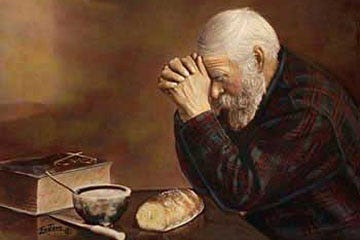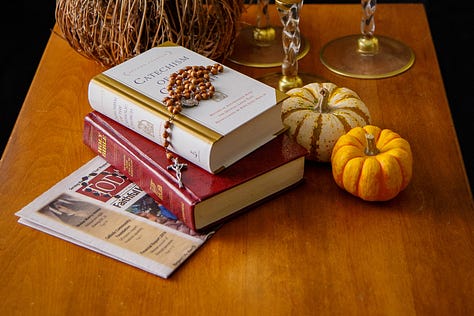I begin the afternoon’s Thanksgiving proceedings with the Anima Christi, the title of which means “Soul of Christ.” The Anima Christi was composed in the early 14th century, quite possibly by Pope John XXII, and remains a nourishing reflection upon our Lord still used in the present day as a private devotion after daily Mass. The text of the prayer is as follows:
Soul of Christ, make me holy. Body of Christ, save me. Blood of Christ, fill me with love. Water from Christ’s side, wash me. Passion of Christ, strengthen me. Good Jesus, hear me. Within your wounds, hide me. Never let me be parted from you. From the evil enemy, protect me. At the hour of my death, call me, and tell me to come to you that with your saints I may praise you through all eternity. Amen.
It is in the spirit of Thanksgiving that I highlight one particular phrase in this beautiful prayer – “Within your wounds, hide me.” Let us call to memory first John 4 as we reflect on these words from the Gospel;
Beloved, let us love one another, for love is from God, and whoever loves has been born of God and knows God. Anyone who does not love does not know God, because God is love. In this the love of God was made manifest among us, that God sent his only Son into the world, so that we might live through him.
In this modern age, the great mass of men have made a pitiful sojourn out and away from the faith of our forefathers; they have come to doubt the possibility that God could really be as simple as love, and they have likewise come to reject the notion that love could really be God. And yet this simple formulation appears to bear immense fruit where it is considered and weighed with childlike ignorance and extreme meekness; for, as is most obvious to discern, mankind’s achievements have been bleak and banal, and in their deepest essence both ugly and cruel wherever they have lacked love. It is only by love that human beings ever manage to accomplish anything beautiful or true or worthwhile or lasting.


And indeed, let us humbly consider that it is truly plausible that this edifying force – love – may be the beating heart of divinity, and as both its corollary and its most complete expression, that God may have walked among us as a humble human man; that indeed, Christ Jesus may have been the purest, most complete, and indeed divine incarnation of love itself.
The Anima Christi calls to memory not only our Lord, imploring Him to guide us in this earthly life and to remember us in death and eternity – but also the memory of his wounds: for in this brokenhearted world which is so often dark and callous, to love is to be willingly wounded. And Christ, as he preached his gentle Gospel of love was subjected to countless cruelties and indignities by human souls too weak and defeated to imagine that love may be powerful enough to deliver us from evil and death. Their aloofness to this possibility hardened them; their rejection of divine love became a self-fulfilling prophecy. It is in the Body of the wounded Christ that we are called to soften ourselves to a love so pure and childlike that we renounce all worldly things which do not originate in the divinity of love.
Through these reflections, the prayerful request of “within your wounds, hide me” reminds us that the edification of the human heart is perhaps most often done in secret. Within the searing pain of the flesh of pure love, tortured and gaping, we ask to be hidden, that we may reach beneath every wound the world has inflicted on us, knowing safety, and in turn, being flooded with a gratitude so radical it reaches into the roots of our every thought and into every cell of our bodies. There, ensconced in the innermost havens of our Shepherd, who is everywhere present filling all things, we find joy in even the slightest blessing – we taste the benevolence of the Creator in even the tiniest moments of peace and the most slight bites of nourishment. And our gratitude is hidden away in an opaline region of the heart where purity reigns, and a hundred-thousand tiny joys grace our hearts, cleansing us.
The spirit of Thanksgiving is not found in the engorgement of the gullet or in the stuffing of the gizzard, nor is it found in anticipation of our culture’s essentially demonic practice of the tellingly-named black Friday. There is a worldly quality to our holidays; as the decades pass they often lose some spirit of simplicity or metastasize into a strange spectacle wherein the most radical expressions of divinity – however humble – fall away, making an absence or a void in the hearts of men. Let us remember, on this day, to hide away in the gaiety and brightness of true love; a love so deep it could’ve made the Rocky Mountains rise from formlessness and could’ve sculpted orchids from ether and the fingers of infants from nothingness. Let us melt away all resentment at the previous wounds of our lives, giving away all memory of darkness as a child lets a balloon float into the sky – let us be so thoroughly present here today that no obstacle exists between ourselves and that infinitessimal and quivering creature which is alive in us; that benevolent and gentle force we call love.



From this point of view, this table is quite like the unexpected port is to the sailor upon rough seas. This is a place of safety and peace; a place where even the slightest blessing is amplified because we are together. Here, the farmer has offered his fruit; the mechanic his expertise and the trucker his nerves upon harrowing roads ravaged by storms. The grocer has balanced his books and stacked the turkeys and fruits to be pleasing to the eye, and the women here have poured themselves out for this day as they’ve cooked and cleaned. Whatever cynicism may have driven men in the supply chain that brings us this repast has died to us and melted away, for we are hidden deep in the warmth below the wounds of love, hiding in a living heaven, in love with one another as friends and family, children sitting at the foot of Christ the Lord.
In this spirit, let us not only eat now – let us be renewed throughout our days, tasting the delicate peace of divine love, surrendering ourselves to the immaculate gingerness of God’s good hand and to His perfectly arrayed fields and forests. Let us give thanks and love one another, that we may find true rest from the trials which the hoarse cacophony of men and their darknesses have made. Truly, in Christ, victory over all cruelties is ours, and for this we must give our constant thanks.




Your writing is beautiful. Its truth is known to the soul like a familiar childhood song to the ear.
Just beautiful: “Let us remember, on this day, to hide away in the gaiety and brightness of true love; a love so deep it could’ve made the Rocky Mountains rise from formlessness and could’ve sculpted orchids from ether and the fingers of infants from nothingness.”
Thank you!
You have written one of the most beautiful pieces I have read about our Savior, about love and gratitude. I pray the Anima Christi, too, in Latin because when I came back to the Catholic Church in 2017, after 40 years away, I promised Our Lord that I would make an effort to learn Latin, at least enough to pray traditional Catholic prayers and read the Bible with some ease, and pray the Rosary daily in Latin. I wanted to make an effort to know the language of the Church. I soon discovered that having memorized Latin prayers helped me pray all the time, especially when I’m traveling on ferries and airplanes. You are a terrific writer. Keep writing. Don’t ever give up. May the Lord confer on you and your family an abundance of graces!